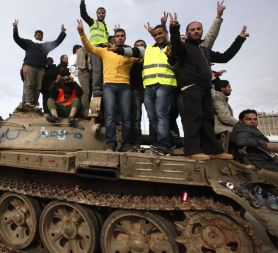Libya crisis: anti-Gaddafi militias seize towns near Tripoli
As fresh fighting breaks out in Libya, Channel 4 News Chief Correspondent Alex Thomson says Colonel Gaddafi’s forces seem to be rapidly losing their grip on key western towns near Tripoli.
Libya remained in turmoil on Thursday, with fighting in areas close to the capital and jubilant Libyans in the east claiming to have conquered towns like Benghazi.
Forces loyal to Muammar Gaddafi launched a counter-attack, fighting gun battles with rebels who have threatened the Libyan leader by seizing important towns close to the capital.
Opposition groups were already in control of major centres in the east of Libya – including the regional capital Benghazi – and reports that the towns of Misrata and Zuara in the west had also fallen brought the tide of rebellion closer to Gaddafi’s power base.
Gaddafi has urged Libyans to take weapons away from protesters who have taken control of large parts of the country.
“The constitution is very clear: take the weapons from them,” Gaddafi said, speaking by telephone to Libyan television.
“I only have moral authority,” said Gaddafi, who has traditionally sought to present himself as a leader of a revolution that is led by the people, rather than a traditional executive head of state.
Forces loyal to Gaddafi attacked anti-government militias controlling Misrata, Libya’s third-biggest city, and killed several people in fighting near the city’s airport.
Channel 4 News Chief Correspondent Alex Thomson is on the border of Libya and Tunisia:
In the desert close to the frontier with Libya the buses unload their cargos at the new camp which has sprung up in the last 24 hours.
Run by the Tunisian army it is there to register and process people coming over the border from western Libya.
Many of the Egyptians say they will have the party of a lifetime when they get home to a country transformed from the one they left to find work on the building sites of Libya.
They also have word, of course, on the situation in the west of the country. The consensus seems to be that Colonel Gaddafi’s forces are rapidly losing their grip on key western towns, such as Zuara on the coast which apparently fell today.
Read more: Egyptians fleeing Libya speak of the fall of western towns.

Soldiers were reported along the roads approaching Tripoli, and fighting broke out in the town of Zawiyah, an oil terminal just 50 km (30 miles) west of Tripoli.
Witnesses said people in civilian clothes, who appeared to be pro- and anti-Gaddafi forces, were firing at each other in the streets.
“It is chaotic there. There are people with guns and swords,” said Mohamed Jaber, who passed through Zawiyah on his way to Tunisia.
In Benghazi, the HMS Cumberland docked and began evacuating UK citizens. Libyans across town were jubilant at what they had achieved – the police station burned and the militia camps emptied.
The uprising has virtually halted Libya’s oil exports, said the head of Italy’s ENI, Libya’s biggest foreign oil operator. The unrest has driven world oil prices up to around $120 a barrel, stoking concern about the economic recovery.
Anti-government militias were in control of Zuara, about 120 km (75 miles) west of Tripoli, Egyptian construction workers who fled into Tunisia told Reuters on Thursday.
The people are in control. Police stations have been burned. Ahmed Osman, Egyptian labourer
There was no sign of police or military and the town was controlled by “popular committees” armed with automatic weapons.
“The people are in control. Police stations have been burned and we didn’t see any police or army in the past few days,” said Egyptian labourer Ahmed Osman.
Separately, lawyers and judges said they had the coastal city of Misrata, 125 miles (200 km) east of Tripoli, in their grip, according to an internet statement.
World leaders condemned Gaddafi’s bloody crackdown on the week-long revolt, but did little to halt the bloodshed from the latest upheaval reshaping the Arab world.
President Obama made his first public comments, condemning as “outrageous” and “unacceptable” attacks on protesters, which have killed hundreds in 10 days.